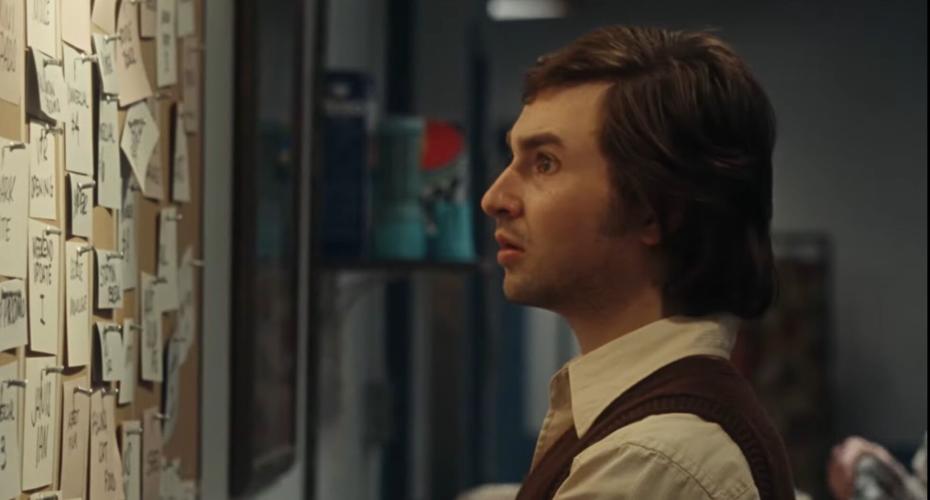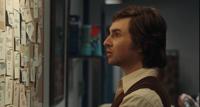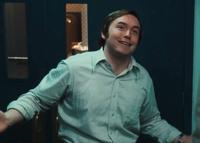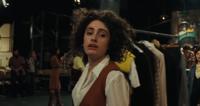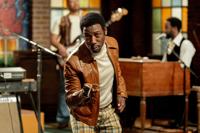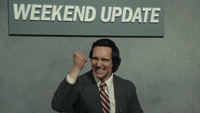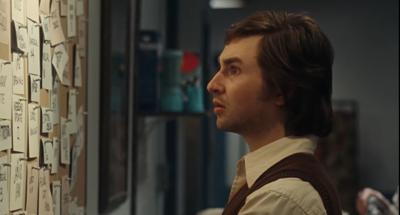The Emmy-winning sketch comedy series known as Saturday Night Live aired its first episode on October 11, 1975. This year marks the 50th season and indeed 50th anniversary. This film was given a limited release theatrically the same weekend as the premiere of that TV season. This film though will go into wide release on October 11, as a symbolic gesture to that original broadcast. It makes sense because this film is about the 90 minutes leading up to that original broadcast and the behind-the-scenes madness that can be endemic to any live television production doing its debut. It's not clear how true any of this depiction is, but this film, directed and co-written by Jason Reitman (Up in the Air and Juno), details all the things that went wrong in those 90 minutes because everything that could go wrong actually did. It also details how one man has to juggle it all and keep from buckling under the pressure.
Gabriel LaBelle (Snack Shack and The Fabelmans) stars as Lorne Michaels, the creator of Saturday Night Live. Lorne is a Canadian comedian who was hired to fill a time-slot that had been dominated by reruns of Johnny Carson, the then host of The Tonight Show (1954). Lorne is a mild-mannered guy who's basically in the center of a storm of strong and eccentric personalities. All those personalities have needs that he has to address and some of the needs are conflicting. Lorne has to be the calm in that center. He's often moving, if not constantly on the go. He's pulled into so many different directions and has to mediate one situation after another, putting out fires, one after the other, sometimes literally putting out fires that might break out on set.

Cooper Hoffman (Wildcat and Licorice Pizza) co-stars as Dick Ebersol, the producer of the show and the one who hired Lorne. Dick is also a NBC executive who does most of the worrying for Lorne. He doesn't really concern himself too much with the specific creative decisions but only the business decisions. During the night of the premiere, a lot of executives and advertisers are in the studio where the broadcast is happening. These men determine if the show will continue to get funded and thus stay on the air. Pleasing them or making sure the show makes money is Ebersol's chief concern. He clashes with Lorne the most in terms of the push-and-pull about pleasing those executives and advertisers.
The film has a ticking clock aspect to it where going live on air is the goal and whether or not the show will be ready for air is the climax. Reitman will put the time on the screen as it counts to its 11:30 PM air time. Because the cast of Lorne's show is large and because we're also bouncing between the writers, as well as some crew, Lorne becomes a pinball bouncing off all of them. It makes the film feel more energetic and not like it ever sits still, not even for a moment. It's unlikely that there is even a single camera shot that isn't handheld. There might be a few that aren't but the cinematography certainly feels constantly on the move.

Rachel Sennott (Bottoms and Shiva Baby) also co-stars as Rosie Shuster, the wife of Lorne Michaels and one of the main writers for the show. She's not the show-runner. She's more or less a de facto left hand for Lorne, helping to deal with cast issues, disputes and conflicts with getting the show on air. If they hadn't called out the fact that they're married, it wouldn't have been obvious. Lorne spends more time with Dick Ebersol than his wife. The film doesn't really give us insight into the writing process. We see the cast rehearsing certain sketches like one where the cast has to dress up as bumblebees, but we don't get much insight as to why this particular sketch was crafted or what the joke of it is supposed to mean.
Lamorne Morris (Fargo and New Girl) plays Garrett Morris, the first Black cast member of SNL. At one point, Garrett questions the writing of the show or particularly his role in the various sketches. He suggests that there might be some racial stereotypes at work. It's really the only time that we get any substantial critique of the show. Not more of it is addressed beyond that one scene. The film does give us glimpses into the writers room, but the majority of those scenes are about how the writers were annoying the NBC censor who was an evangelical attempting to cut all the sexual innuendo, which was probably true to life, but having a look at how the writers might have been crafting racial stereotypes seems beyond the scope of Reitman's narrative.

Now, if you don't know anything about SNL's history or much about the original cast, I'm not sure much of what we get here will illuminate the cast to any significant degree. Appropriately, this film only gives us sketches of each of these people. The people who get the short shrift are mainly the female cast members on SNL. However, there is a moment when the women turn the tables on sexist and objectifying behavior that have been directed at them. Dylan O'Brien (The Maze Runner and Teen Wolf) plays Dan Akroyd, a cast member who seems to be a bit of a womanizer. The women do make him the subject of a sexist and objectifying sketch that was well performed. I just wonder if the film was trying to say that this sketch was specifically designed for Dan or not.
Cory Michael Smith (Carol and Gotham) is a scene-stealer as Chevy Chase who was considered the funniest cast member. He probably gets the biggest arc of any person in the film. He begins as someone who struts around very arrogantly and with an inflated ego. By the end of the film, he gets knocked down a peg or two, especially after a scene where he literally loses a dick-measuring contest.

Nicholas Braun (Succession and 10 Thing I Hate About You) rounds out the cast as Andy Kaufman who is really a nothing-character. Yet, Braun also plays Jim Henson, the legendary puppeteer and the creator of the Muppets. There was a running gag about him that was funny and interesting. I wish the film had more time to explicate why the cast and the writers were so dismissive of him. We can extrapolate that many thought him weird because of his obsession with puppetry, which is enough for what this film is doing.
Rated R for language, sexual references, some drug use and brief graphic nudity.
Running Time: 1 hr. and 49 mins.
In theaters.


